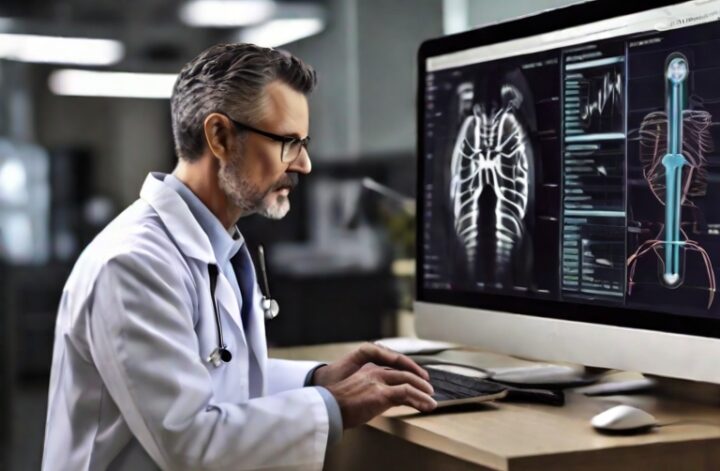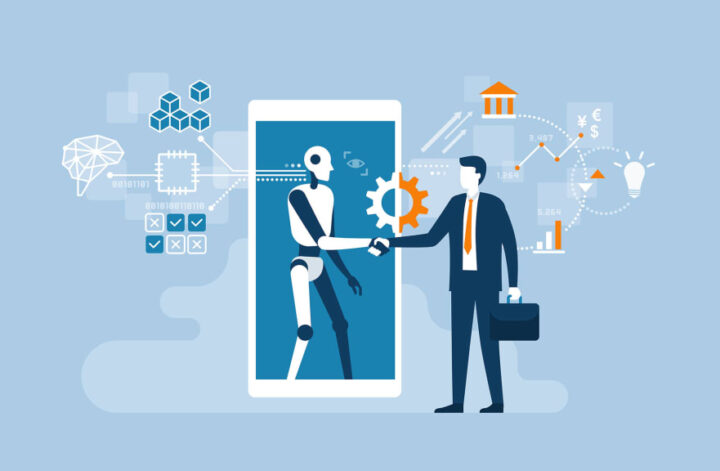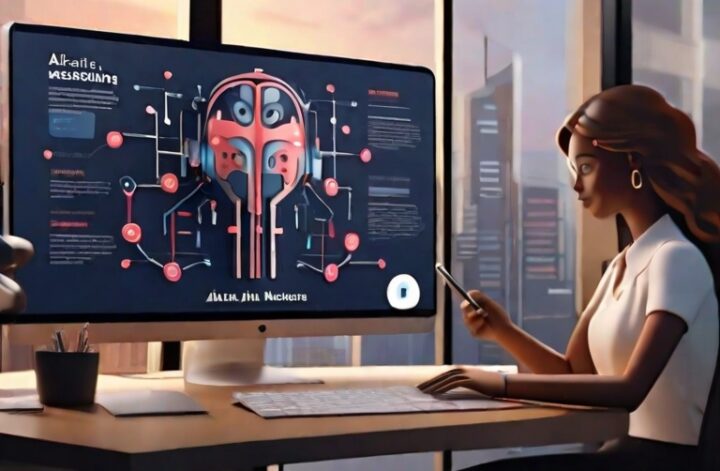In the landscape of healthcare, artificial intelligence has become a transformative force. The AI tools are reshaping the very essence of medical practices, and administrative workflows. The ability of AI in Medical Research to execute tasks traditionally handled by humans, but at accelerated speeds and reduced costs, is revolutionizing the healthcare industry.
AI is able to unraveling intricate genetic codes to empower surgical robots, streamline administrative processes, tailor personalized treatment plans, and beyond. AI in Medical Research is a multifaceted gem propelling the sector into a new era.
In essence, it’s not just a technological advancement; it’s a reinvention. A reinvigoration of modern healthcare, where machines seamlessly comprehend, learn, and act in ways that were once confined to the realm of human expertise.
To navigate this rapidly evolving field, let’s explore some of the standout examples where AI is making its mark. Delve into the forefront of innovation with the companies leading the charge, and witness firsthand how AI is not merely a tool but a transformative catalyst, charting a course towards more efficient, personalized, and accessible healthcare solutions.
Transformative Diagnostics: Seeing the Unseen with AI
Imagine a world where diseases are diagnosed swiftly and accurately, thanks to the keen eyes of AI. This vision is becoming a reality with AI-powered image recognition. Radiologists and pathologists are now equipped with tools that can analyze intricate medical images. For instance, X-rays, MRIs, and CT scans, leading to faster and more precise diagnoses. AI is enhancing our ability to detect conditions like cancer, fractures, and neurological disorders.
AI’s prowess in image recognition stands as a prime example of its transformative impact. Radiologists and pathologists are no longer solely reliant on their keen eyes; instead, they are empowered by algorithms that can meticulously analyze intricate medical images—be it X-rays, MRIs, or CT scans. This partnership between human expertise and machine precision ensures not only faster but more precise diagnoses. Hence, setting the stage for early detection and intervention in conditions ranging from cancer to neurological disorders.
The ability of AI to “see” patterns and anomalies in medical images transcends human capabilities, allowing for a level of scrutiny and analysis that was once inconceivable. In essence, AI becomes the indispensable collaborator, sifting through vast datasets with a speed and accuracy that human counterparts would find daunting.
Moreover, the transformative impact of AI in diagnostics extends beyond mere image recognition. Pathology analysis, a critical component in disease identification, is now bolstered by AI algorithms capable of deciphering intricate patterns in tissue samples. This not only expedites the diagnostic process but also enhances the reliability of results, paving the way for more effective and targeted treatment strategies.
Accelerating Drug Discovery: From Hunches to Hypotheses
The journey from a potential drug candidate to a life-saving medication is notoriously long and arduous. However, AI is reshaping this landscape by significantly expediting the drug discovery process. Virtual screening powered by machine learning algorithms can sift through colossal datasets, predicting potential drug candidates and significantly reducing the time and resources required for development. Additionally, AI facilitates drug repurposing, uncovering hidden potentials in existing medications for novel therapeutic applications.
Decoding the Genetic Puzzle: AI in Genomic Medicine
Genomic medicine, with its focus on understanding the role of genetics in health and disease, is benefiting immensely from AI. Algorithms can analyze vast genomic datasets, identifying genetic markers associated with diseases and enabling personalized treatment plans. Variant interpretation, a traditionally complex task, is now streamlined with AI, aiding researchers in unraveling the mysteries of genetic mutations and their impact on health.
Clinical Trials in the Digital Age: Smart Recruitment and Real-time Monitoring
Clinical trials are the backbone of medical research, but their success hinges on efficient patient recruitment and vigilant monitoring. Enter AI, the silent orchestrator behind the scenes. By analyzing electronic health records, AI algorithms can identify suitable candidates for clinical trials, ensuring trials are not only populated faster but also with participants who are most likely to benefit from the intervention. Real-time monitoring during trials further enhances safety and efficiency, ushering in a new era of precision in clinical research.
Personalized Medicine: Tailoring Treatments to Individuals
The concept of one-size-fits-all in medicine is rapidly becoming obsolete, thanks to AI-driven personalized medicine. By analyzing patient data, AI can recommend tailored treatment plans based on individual characteristics, significantly improving treatment outcomes. Predictive analytics, another facet of AI in personalized medicine, enables healthcare professionals to anticipate disease progression and treatment responses. This empower them to make informed decisions that resonate with the uniqueness of each patient.
Navigating the Sea of Knowledge: AI-Powered Literature Review
Staying abreast of the latest scientific literature is a formidable task, given the sheer volume of publications. Natural Language Processing (NLP) comes to the rescue, with AI algorithms that can mine through mountains of text, extracting relevant information for researchers. This not only saves time but also ensures that medical professionals have access to the most recent and pertinent findings in their field.
Again, AI’s prowess in text mining allows it to sift through mountains of scientific literature. By doing so is able to extract relevant information with a speed and accuracy that human researchers could scarcely match. The cumbersome task of manual literature review, is now streamlined by algorithms that tirelessly scan and categorize information. Thus, presenting researchers with the selection of the most pertinent findings.
Moreover, AI transcends the limitations of sheer volume, recognizing patterns and connections that might elude the human eye. It goes beyond a mere summary, delving into the intricate web of citations, references, and contextual relationships between studies. In doing so, AI not only accelerates the literature review process but also facilitates a deeper understanding of the broader scientific landscape.
The impact of AI in literature review extends beyond individual research projects. Collaborative platforms employing AI algorithms enable medical researchers globally to share insights, fostering a collective intelligence that propels the entire field forward. The once-isolated islands of knowledge are connected, forming a cohesive archipelago of information accessible to all.
Empowering Patients: Remote Monitoring and AI in Wearable Technology
The future of healthcare isn’t just confined to hospitals and clinics; it extends to our daily lives through wearable technology. AI integrated into wearables allows for real-time monitoring of vital signs and health parameters. This not only facilitates proactive management of chronic conditions but also opens up avenues for preventive care. Imagine a world where your smartwatch not only tracks your steps but also monitors your heart health and alerts you to potential issues—this is the transformative power of AI in remote patient monitoring.
Precision in the Operating Room: AI-Powered Robotic Surgery
The operating room is witnessing a revolution with the integration of AI into robotic surgical systems. AI-powered robots are not replacing skilled surgeons but rather acting as invaluable assistants. They enhance precision, reduce the risk of errors, and enable surgeons to perform complex procedures with unprecedented accuracy. The marriage of human expertise and AI prowess is a testament to the collaborative future of healthcare.
Beyond Consultation: Healthcare Chatbots for Patient Engagement
AI is not just about diagnosis and treatment; it’s about engaging with patients on a personal level. Healthcare chatbots, powered by AI, are becoming virtual companions for individuals seeking health information. From answering queries to assisting with appointment scheduling, these chatbots are enhancing patient engagement and support, providing a human touch in the digital realm.
Safeguarding Data Integrity: AI and Blockchain Technology
As the medical field embraces AI, concerns about data security and privacy loom large. Blockchain technology, with its emphasis on decentralized and secure data storage, is becoming a crucial companion to AI in healthcare. This combination ensures the integrity and confidentiality of medical data, instilling confidence in patients and researchers alike.
Conclusion: Towards a Brighter, Healthier Tomorrow
The future of AI in Medical Research is undeniably intertwined with its transformative power. As we navigate this uncharted territory, it is crucial to address ethical considerations, regulatory challenges, and ensure seamless integration into existing healthcare systems.
The collaboration between researchers, healthcare professionals, and technology experts will be the driving force behind the success of these AI tools. Together, we are not just envisioning a future of better healthcare—we are actively shaping it. The dawn of a new era in medical research is upon us, and the possibilities are limitless. Embrace the future; it’s brighter and healthier than ever before.



